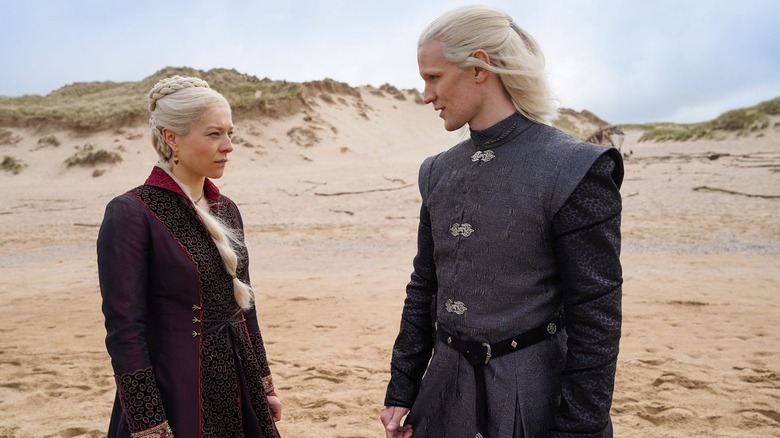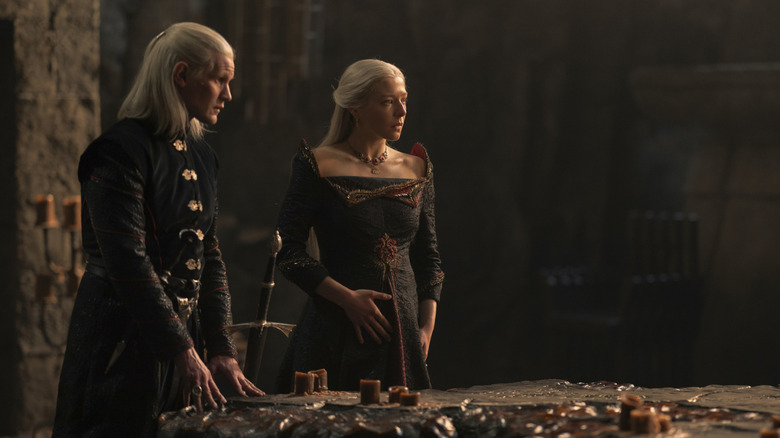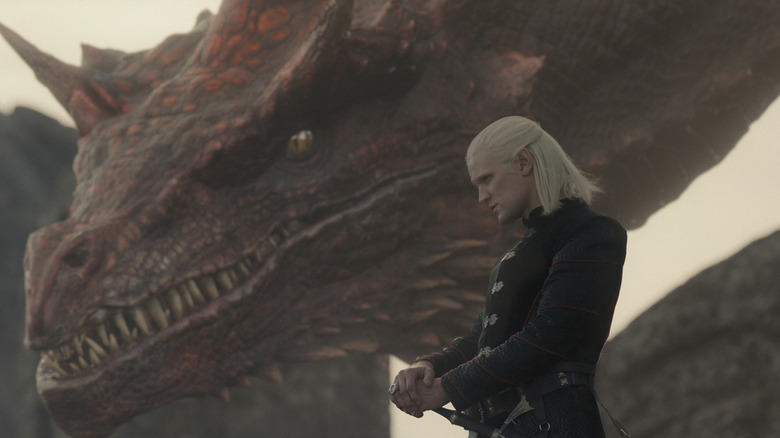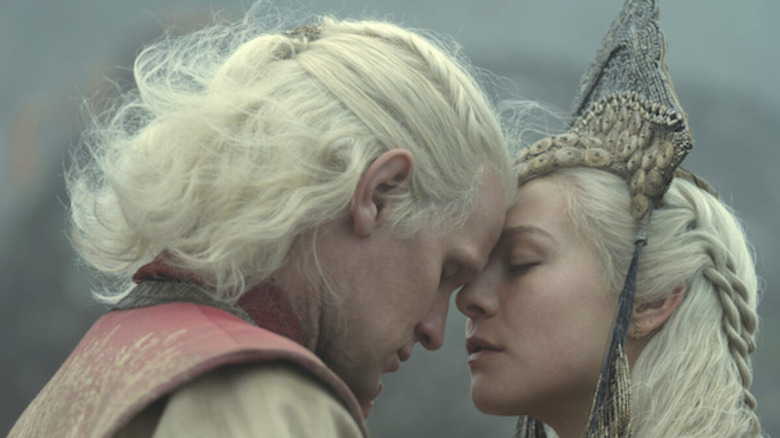House Of The Dragon Has Redefined Rhaenrya And Daemon's Relationship Once Again
For a few weeks there, Daemon Targaryen (Matt Smith) was a bit of an internet darling among "House of the Dragon" fans. Yes, his character might be technically evil, but the guy was charming, intelligent, and he seemed to be, uh, genuinely in love with his niece. Yes, he murdered his first wife, but at least he seemed kind of upset about the death of his second wife, and for a while there his relationship with Rhaenyra (Emma D'Arcy) was borderline wholesome.
The height of the Daemon love came after "The Lord of Tides," which notably featured a scene where Daemon beheads a guy for calling his wife a whore. Viewers love a guy who passionately defends his wife in over-dramatic ways, but what made it even better was the fact that Daemon subtly asks permission from his wife before he acts. Shortly before the beheading, we see him look over towards Rhaenyra, who gives a small nod that basically says, "have at it."
By the week leading into the season finale, the love for Daemon reached the point where it was puzzling the writers a little. When writer/producer Sara Hess was asked about how Daemon had become an "internet boyfriend"-type character, she said she was "a little baffled" by it: "I'm just like: 'Really?' How — in what way — was he a good partner, father or brother — to anybody?"
Hess caught some flak for this comment, mainly because it seemed pretty obvious why fans would cling to Daemon: he's a pro-active, interesting character played by the charming Matt Smith. But the events of the finale help to put the comment in a new perspective. Daemon's fleeting status as a true wife guy is now firmly in the rear-view window.
Check in on your wife, dude
The finale starts off with Daemon and Rhaenyra getting the news that King Viserys (one of the show's best characters) has died and the Hightowers have usurped the throne. Immediately after hearing the news, Rhaenyra goes into labor way too early in her pregnancy. As she struggles for hours, Daemon coldly continues making war plans in the other room, and tries to disobey her wishes to hold off on waging battle.
Daemon seems almost indifferent to Rhaenrya's suffering, which might surprise viewers who were swayed by his seemingly kind moments from a few episode before. It calls into question whether his murder of Vaemond was really out of love for his wife, or if it was solely to preserve his own status. It makes you wonder if Daemon helping Viserys' walk to the throne was anything more than him strategically flattering an ally.
Things get worse after Rhaenyra's miscarriage, when she seems to be considering the Greens' request for her to bend the knee. Their argument doesn't go on for long before Daemon starts choking her. It's a decision that's received significant backlash from fans of the character, mainly because despite Daemon's many flaws, he was never an abuser in George R.R. Martin's source material. (Okay so yes, he killed his first wife, but this is Westeros, and we have to grade on a curve.)
Lots of changes to the source material
Then again, "Fire & Blood" is not written like the original "A Song of Ice and Fire" books. It's written from the perspective of historians piecing accounts together, which means it's lacking the intimate look at the characters' psyches that George R. R. Martin's other books have always included. Nearly every time there's a private scene between two characters in this show, the series writers are creating original material. It's not technically unfaithful to the source material to take this route with Daemon, but why would they if they didn't have to?
Then again, Daemon isn't portrayed as a total villain; with Rhaenyra's coronation and the scene where Daemon has to give her the bad news about her son, it's clear that there is still genuine love between them. There's also the fact that after he chokes her, Rhaenyra realizes that Viserys never told him about Aegon's dream, and the balance of power seems to shift a little again. As Emma D'arcy put it: "Fundamentally, when Rhaenyra realizes Daemon was never taught the prophecy, she suddenly gains legitimacy. Because she understands that it was her, she was chosen for this."
But even though Daemon's technically done far worse than choking people throughout the first season, this one scene may have done more damage to viewers' opinion of him than anything else. After all, murder is cheap on this sort of TV show; it's why Tony could kill plenty of people in cold blood throughout "The Sopranos," but the writers never once had him hit his wife. Viewers can easily get behind a fictional murderer, but not a fictional abuser.
Where to go from here
But then again, maybe the writers don't want viewers to get behind Daemon. Showrunner Ryan Condol recently explained that he considered him choking Rhaenyra to be "one of those things that's been set up over the course of the entire season. Daemon — while an incredibly charismatic and deeply interesting, complex character, I think — he's also capable of great darkness."
Before the finale, the only episode where we've really gotten to see what things are like between the married couple was an episode where they were constantly interacting with their enemies as a united front. It's only in the finale that we've seen how they act without their enemies within the same castle, and it turns out that their dynamic is not quite as wholesome as "The Lord of Tides" made it seem.
Yes, it shouldn't be surprising that the repeated murderer who married his much younger niece isn't acting like the best husband, but this might be the splash of cold water fans of Team Black need as we enter the war the show's centered around. As we're left waiting for the show's second season, Rhaenyra and Daemon's relationship seems to have been left in a position that's messier and more uncomfortable to watch than many of us would've preferred, but it's also far more interesting.
Daemon was always supposed to be a deeply complicated character, and the show seems perfectly comfortable denying us any sort of sanitized version of him. Considering all the problems that came from the original show's refusal to portray the dark side of Tyrion (Peter Dinklage), the prequel's lack of squeamishness with Daemon is probably for the best.



